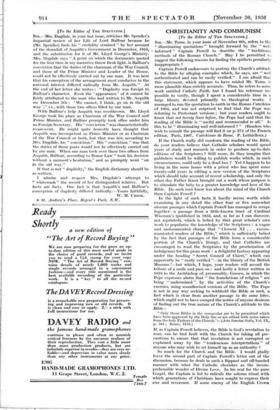[To the Editor of THE SPECTATOR.] Dugdale, in your last
issue, criticises Mr. Spender's impartial review of her Life of Lord Balfour because he (Mr. Spender) finds his " credulity strained " by her account of the downfall of Asquith's Government in December, 1916, and the substitution for it of Mr. Lloyd George's Ministry. Mrs. Dugdale says "A point on which the documents quoted for the first time in my narrative throw fresh light, is Balfour's conviction that the duties of the chairman of the War Council, and those of the Prime Minister and Leader of the House, could not be effectively carried out by one man. It was here that his conception of the arrangement most conducive to the national interest differed radically from Mr. Asquith." At the end of her letter she writes : " Duplicity was foreign to Balfour's character. Even the ' appearance ' of it cannot be fairly attributed to the man who had written to Mr. Asquith on December 5th : ' We cannot, I think, go on in the old way '," i.e., with those two ollices filled by one man.
With Balfour's help Asquith was overthrown. Mr. Lloyd George took his place as Chairman of the War Council and Prime Minister, and Balfour promptly took office under him as Foreign Secretary. His conviction " was characteristically evanescent. He might quite honestly have thought that Asquith was incompetent as Prime Minister or as Chairman of the War Council or both, but that was not, according to Mrs. Dugdale, his " conviction." His " conviction " was that the duties of those posts would not be effectively carried out by one man. When one man took over these two offices from Asquith, Balfour, according to Bonar Law " took his decision without a moment's hesitation," and as promptly went "on in the old way."
If that is not " duplicity," the English dictionary should be re-written.
I admire and respect Mrs. Dugdale's attempt to " whitewash" the record of her distinguished relative. But facts are facts. One fact is that Asquith's and Balfour's conception of duplicity differed radically.—Yours faithfully, W. M. CROOK.
6 St. Andrew's Place, Regent's Park, N.W.




























































 Previous page
Previous page